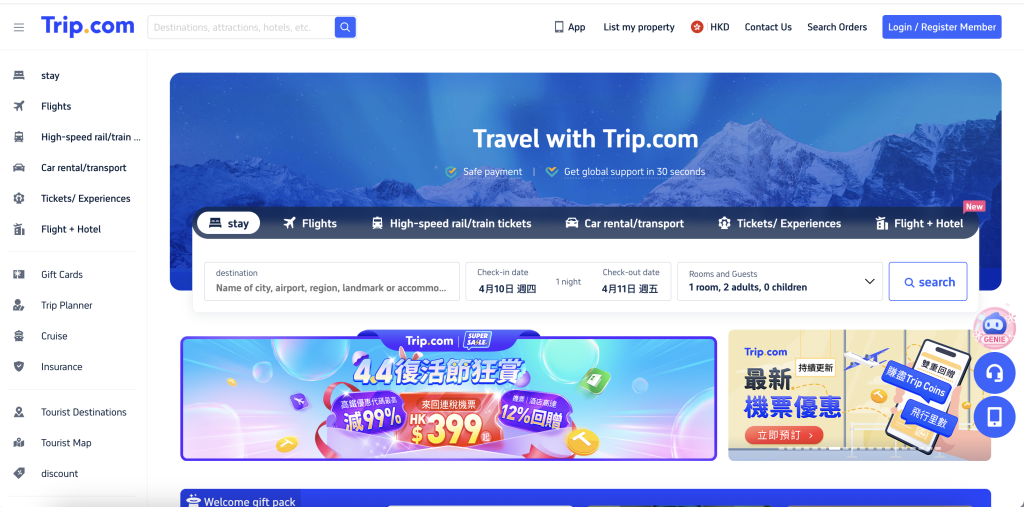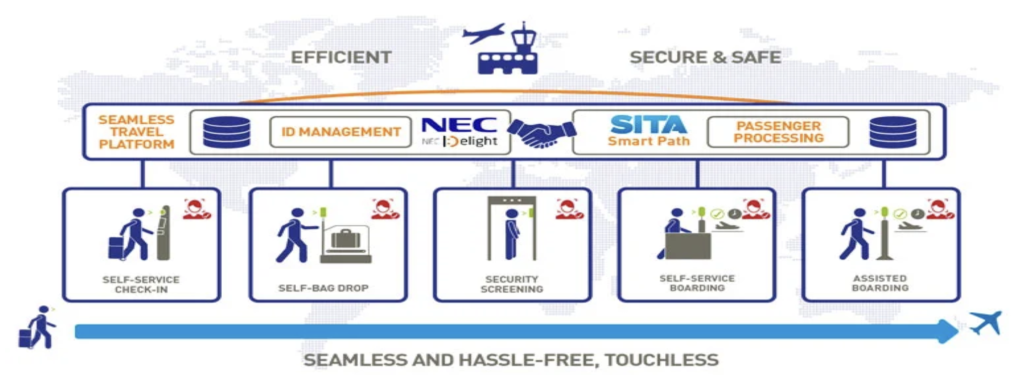
Imagine you’re getting ready to plan your next trip, you simply open a travel app on your phone and instantly receive personalized recommendations for hotels, flights, and attractions. It all seems so efficient and convenient, almost like magic. But have you ever wondered what kind of system is behind this smooth experience?
The AI-Powered Transformation of Travel
Personalized Recommendations
Travelers often have to think about where should they go. For example, they may be wondering whether they should go to Kyoto to experience the ancient culture or Tokyo to see the modern city view. Or maybe they’re debating whether to go to Paris for world-class art or Bali for a relaxing day on the beach? Many people are not entirely clear about their true desire. Every wrong choice means extra expense, wasted time, and an unpleasant experience; for businesses, consumer dissatisfaction can lead to customer complaint and a flood of negative reviews.
AI-powered travel planning tools can save this dilemma. A 2021 iResearch report found that platforms using AI for personalized recommendations can boost conversion rates by up to 25% (iResearch, 2021, p. 14). Ctrip’s annual report reinforces this by stating, “Our data-driven recommendation engine is pivotal in crafting a tailor-made travel experience for every user” (Trip.com Group, 2024, p. 8).

Picture 1: A snapshot of Trip.com’s travel booking interface, offering a seamless experience for customers to plan trips with options for flights and stays
Source: Trip.com
AI creates detailed customer profiles by collecting comprehensive data about travelers, such as browsing history, social network information, preference and behaviors. Intelligent algorithms then provide tailored recommendations based on the user’s needs, selecting the most suitable travel destinations, hotels and flights and generating a detailed plan. AI makes it possible to book a trip with a single click, eliminating the need for users to compare offers or make repeated inquiries.
Dynamic Pricing and Smart Booking
In addition to personalized recommendations, dynamic pricing is another important technology that is changing the way travel is done. In peak travel seasons or popular destinations, the platform will monitor the market supply and demand in real time, and adjust the price of air tickets and hotels through big data, so that different users may see very different prices. However, this practice has also triggered a lot of a phenomenon commonly known as “big data killing the familiar.”
For example, a widely reported case from Zhejiang province revealed that a loyal customer was charged ¥2,889 per night for a hotel room on Ctrip, while new users were offered the same room for only ¥1,377 (Lee & Sheng, 2021, p. 182). Social media platforms such as Weibo rapidly buzzed with screenshots of these price disparities, sparking public outcry.
Many netizens have taken screenshots of the difference in prices and written articles on Weibo and Zhihu to complain about the unfairness of the platform. This kind of rights defense not only reflects consumers’ dissatisfaction with privacy and fairness, but also provides strong public opinion support for relevant regulators. After receiving a large number of complaints, the regulator launched investigations into some platforms and issued new guidance to enhance data transparency and ensure the fairness of dynamic pricing.
Privacy, Opacity, and Algorithmic Governance
Data Collection: A Double-Edged Sword
Personalization and dynamic pricing can’t be achieved without a lot of data. Every time you search, click, and book on a travel app, you provide data to the platform to continuously improve your user profile. However, this massive data collection also brings the risk of privacy leakage.
Research by Chen, Zheng, and Mou (2025, p. 12) shows that Chinese Internet users perceive a large portion of personal data, such as travel histories, payment methods, and geolocation, as highly sensitive. In fact, their study found that over 61% of the different categories of personal information surveyed are deemed “highly sensitive.” This means that while users enjoy convenient and fast services, their personal privacy may be over-collected and abused.
The “Black Box” Nature of Algorithms
One of the most significant challenges with AI in travel is the “black box” nature of algorithms. When you see a “Recommended” label or dynamic price, you rarely know why that specific option was chosen. As Frank Pasquale (2015, p. 37) famously points out in The Black Box Society, if the internal workings of an algorithm are hidden, consumers must simply trust its outputs—even if those outputs might benefit the platform more than the user.
Digital Identity: the Key to Connecting and Protecting
Emerging Global Digital Identity Trends
In addition to personalized recommendations and dynamic pricing, digital travel platforms are embracing another technological change: digital identity. Booking.com, the world’s leading digital travel platform, is expanding its artificial intelligence capabilities to provide travelers with more personalized and accurate travel solutions through smart filtering, listing quizzes and review summaries.
Similarly, recent news reports indicate that air transportation technology giant SITA and biometrics leader NEC Corporation are strategically partnering to accelerate the global adoption of digital identity technology. Through this collaboration, SITA and NEC will further unlock the potential of seamless, next-generation passenger processing solutions, making mobile, contactless airport processes a reality. This will allow passengers to use their digital identity on their mobile phone at every step of their journey. Passengers will use their biometric identity to check in, pay, drop off bags, and go through security, immigration and boarding, simply by scanning their face at each step.
Digital Identity: the key to connecting and protecting
Emerging Global Digital Identity Trends
In addition to personalized recommendations and dynamic pricing, digital travel platforms are embracing another technological change: digital identity. Booking.com, the world’s leading digital travel platform, is expanding its artificial intelligence capabilities to provide travelers with more personalized and accurate travel solutions through smart filtering, listing quizzes and review summaries.
Similarly, recent news reports indicate that air transportation technology giant SITA and biometrics leader NEC Corporation are strategically partnering to accelerate the global adoption of digital identity technology. Through this collaboration, SITA and NEC will further unlock the potential of seamless, next-generation passenger processing solutions, making mobile, contactless airport processes a reality. This will allow passengers to use their digital identity on their mobile phone at every step of their journey. Passengers will use their biometric identity to check in, pay, drop off bags, and go through security, immigration and boarding, simply by scanning their face at each step.

Picture 2: Illustration of a seamless, touchless travel process, featuring steps from self-service check-in to assisted boarding, emphasizing the efficiency and security of modern airport experiences.
Source: sita.aero
The partnership will allow NEC to join SITA’s Digital Travel Ecosystem, which is designed to address cross-system interoperability and enable seamless, secure and efficient authentication of digital identities within the travel industry.
Scholars Just and Latzer (2017, p. 240) argue that algorithms effectively construct our social reality by deciding which options are most visible, thereby influencing our choices. This lack of transparency can lead to distrust. If you suspect that a travel platform is selectively showing you pricier options based on your history, you might begin to question its fairness and reliability.
How Digital Identity is Improving the Travel Experience
Digital identity technology brings many advantages to the travel industry. For example, on the Booking.com platform, travelers can use intelligent filtering tools to describe their ideal accommodation in their own words, such as “a five-star hotel with a gym in the district of darling harbour”. Artificial intelligence algorithms analyze massive amounts of data to rank hotels, vacation rentals, and flights based on user preferences, property availability, price trends, wish lists, or previous stays. This not only significantly reduces travel planning time, but also makes the entire booking process more personalized and relevant.
At the same time, customers can directly ask questions such as “Is there a gym and swimming pool in the hotel?” or “How far is it from the airport, subway station or major attractions?” Generative AI instantly extracts relevant information from massive amounts of data, user reviews and images, and summarizes concise answers to help travelers make quick decisions.
In order to improve customer service and cut down on wait times, KLM Royal Dutch Airlines uses a chatbot called “BlueBot” to help customers with reservations and flight updates. This digital assistant operates across multiple channels—such as Facebook Messenger, WhatsApp, and the airline’s own website. BlueBot uses natural language processing to engage with customers in a conversational manner, answering questions like “How do I check in?” or “What are the baggage allowances for my flight?”

Picture 3: A conversation between a user and a travel chatbot, offering personalized assistance in planning a vacation, demonstrating the use of AI in the travel industry
Source: epam
By efficiently managing daily tasks and providing customized travel advice based on individual preferences and behaviors. It makes searching and booking more user-friendly and is good for developing a global digital identity.
Privacy Protection for Digital Identity
Traveling has been made much easier by the development of digital identity technology. But it has also raised questions about personal data security and privacy. The gathering and preservation of vast quantities of personal information, particularly biometric information like fingerprints and facial recognition can have irreversible consequences in case of leakage. In recent years, the Chinese government started to introduce a number of laws, and set high requirements for data security, requiring platforms to follow the principle of “privacy by design” in their technical design to be sure that users can control their own data.
Singapore’s Singpass is a global digital identity practice success case. The national digital identity program led by the Singapore government has won the favor of more than 97% of respondents with strict data protection and user autonomy. These cases not only provided invaluable experience for the development of digital identity technology in China, but also reminded us that we must find a balance between identity security and convenience, between regulation and innovation while promoting digital identity.
How to Set a Fair and Transparent Digital Travel System
Considering both the opportunities and threats of technology, a secure and efficient digital travel ecosystem should be built. Several key strategies should be implemented by collaborative efforts of platforms, regulators, and consumers.
Increase Algorithm Transparency
Efforts need to be made by platforms to make users understand the algorithmic logic behind the recommendations. This may include introducing a function that explains why they recommend. For example, when you see a recommendation for a hotel, the system can tell you that “based on your past bookings in Shanghai, we think this hotel best meets your needs”. This transparent practice not only helps to remove users’ doubts, but also prompts platforms to self-check and optimize their algorithms.
Expanding User Data Control and Privacy Settings
Users need to feel that they are in control of their personal information. This means providing detailed privacy settings so they can decide what data to share. Chen, Zheng, and Mou (2025, p. 14) found that when users have the power to limit data collection (for instance, by disabling location tracking or restricting certain personal details), their trust in the platform increases. Platforms should also present simple, well-illustrated privacy policies to educate users about what data is being collected and how it is used.

Picture 4: Visual representation of privacy in the digital age, highlighting key concepts such as data protection, security, and personal information management.
Source: Pinterest
Strengthening Regulatory Oversight
Governments have a crucial role in ensuring digital platforms operate fairly. In recent years, China’s Personal Information Protection Law (PIPL, 2021) and related regulations have started to impose strict requirements on how companies collect, use, and store data. Regulatory bodies are also monitoring dynamic pricing practices, as evidenced by multiple fines and public warnings issued in response to price discrimination incidents (Lee & Sheng, 2021, p.183). Such measures not only protect consumers but also drive platforms toward greater transparency and ethical data practices.
Consumer Education and Industry Collaboration
To build a fair and transparent digital ecosystem, it is necessary not only for companies to self-regulate and governments to regulate, but also to raise consumers’ awareness of data use. Platforms can help users understand the entire process of data collection, storage and use by publishing concise privacy policies, hosting online seminars and collaborating with consumer rights organizations. At the same time, there should be cross-platform cooperation within the industry to develop unified standards for data governance and algorithmic transparency, setting a benchmark for the entire digital travel sector.
If a balance can be found between convenient experience and fairness and transparency, then the future of digital travel will not only be a triumph of technology and efficiency, but also a healthy ecology that protects the rights and interests of users and enhances public trust. Only when the platform open algorithm “black box”, give users full control of data, and with regulators, consumers to build a transparent governance system, digital travel can truly realize the original intention of science and technology for the people.
Conclusion
In an age where technology plays an important role in every aspect of our travels, algorithmic systems, AI and digital identities have brought extraordinary convenience, speed and personalization to the travel experience. Today, it is possible to plan, compare and book a trip in short order. Rapid digital technology development indeed has improved our travel experience with personalized hotel recommendations, generative AI and virtual assistant. However, discrimination by price under algorithmic manipulation, opaque decision logic, and excessive collection and use of personal data still exist as ethical and regulatory issues.
Future technical advancements will be necessary to redefine structures and responsibilities for digital travel. Platforms must aggressively increase algorithm openness, create reliable data security measures, and grant consumers greater power in order to achieve genuinely sustainable development. Consumer advocacy organizations and government regulators should collaborate to establish more transparent, equitable, and responsible industry standards in the meantime.
References
Andrejevic, Mark (2019), ‘Automated Culture’, in Automated Media. London: Routledge, pp. 44-72.
Chen, X., Zheng, P., & Mou, J. (2025). Understanding Chinese internet users’ information sensitivity in big data and artificial intelligence era. Policy & Internet, 17(1), e419. https://doi.org/10.1002/poi3.419
Just, Natascha & Latzer, Michael (2019) ‘Governance by algorithms: Reality construction by algorithmic selection on the Internet’, Media, Culture & Society, 39(2), 238–258. https://doi.org/10.1177/0163443716643157
Lee, E., & Sheng, W. (2021). Chinese regulators target price discrimination. TechNode. https://technode.com/2021/07/15/regulators-target-price-discrimination/
Noble, S. U. (2018). Algorithms of Oppression: How search engines reinforce racism. New York: NYU Press.
Pasquale, Frank (2015). ‘The Need to Know’, in The Black Box Society: the secret algorithms that control money and information. Cambridge: Harvard University Press, pp.1-18.
Trip.com Group (2024). 2024 Second Quarter Financial Results. (Excerpt in EqualOcean analysis “Ctrip’s New Opportunity: Chinese Enterprises Going Global”).
Zhang, L. (2024). Ctrip’s new opportunity: Chinese enterprises going global. EqualOcean. https://equalocean.com/analysis/2024112621206

Be the first to comment